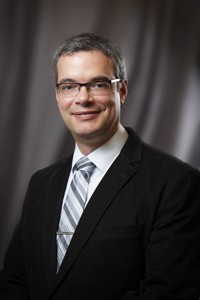Latina/o Literature Exhibit at UH Libraries

Encounters and Discoveries in Literature: Celebrating Arte Público Press and Twentieth Century Latina/o Literature
A new exhibit will open at the University of Houston Libraries in January 2016.
Encounters and Discoveries in Literature: Celebrating Arte Público Press and Twentieth Century Latina/o Literature is a retrospective look at Arte Público Press and its place in the larger context of Latina/o literature throughout the 20th century. Founded in 1979, Arte Público Press and its subsidiaries paved the way for numerous celebrated authors, such as Alicia Gaspar de Alba, Sandra Cisneros, Rolando Hinojosa, Graciela Limon, Américo Paredes, and Tomás Rivera, while also recovering early unpublished works by Latinos and leading the way for inclusive children’s literature.
Materials in the exhibit will include books, archival documents, photographs, and works of art produced or recovered by Arte Público Press and its subdivisions, Piñata Books and the Recovering the US Hispanic Literary Heritage Project. Beyond a mere presentation of objects and literary works, the contents of the exhibit explore the Latina/o experience and the societal conditions documented in Arte Público’s publications.
The public is invited to the exhibit opening reception, which will be held on Wednesday, January 20, 2016 from 6:30 to 8:00 p.m. at the MD Anderson Library Rockwell Pavilion. For more information, contact Lisa Cruces.
Mary Manning on KPFT Houston

KPFT Houston Open Journal
University archivist and curator of Performing and Visual Arts Mary Manning discussed Special Collections on the November 2 episode of KPFT Houston Open Journal. Listen
Head of Special Collections Brings New Outlook to Archives
For the first time in over 30 years, a new head of Special Collections has joined the University of Houston Libraries.
Christian Kelleher, former archivist and assistant head librarian at the University of Texas at Austin Nettie Lee Benson Latin American Collection, began his appointment at UH this summer. As head of the thriving Special Collections, Kelleher envisions his role as providing direction and prioritization to the innumerable collecting opportunities, and as a supporter of the talented group of librarians and archivists working with unique and rare materials. He will continue to build upon the department’s robust collecting areas, and develop programs that bring the collections to more people.
One of Kelleher’s priorities is to broaden digital collections to support scholarship on a grand scale. In today’s environment of increased access and new forms of data, Special Collections is expanding its ability to bring more primary sources to more scholars in a number of fields, not the least of which includes digital humanities projects.
While the paradigm of the reading room is a mainstay of access to archival materials, Kelleher strives to supplement this practice by bringing more primary resources online and into the classroom. “We have wonderful collection materials that are being developed in such a way that they can support scholarship in the new scholarly environment,” Kelleher said. “Visitors do come into the reading room and use materials there, but it’s not always that way.”
Additionally, an outreach and exhibition program allows more students and faculty to interact with archival materials. Kelleher seeks to expand the reach of exhibits not only inside the Libraries, but also by contributing Special Collections’ archives to exhibits at museums or libraries worldwide. It’s about getting more materials out from behind the walls of the reading room of the archives, and facilitating interaction between the archives and members of the community.
Kelleher aims to develop more partnerships with students in order to bring their historical materials to the University audience, and provide a venue for them to tell their unique story. In this way, student engagement with archives in Special Collections presents great opportunities to have a positive impact on academic success and scholarship.
“One of the reasons I was so attracted to this position at the University of Houston Libraries is that the university and the city are both extremely diverse,” Kelleher said. Leveraging archives “is a great way to demonstrate to students that their experiences and cultures are important and valuable, and can inform the scholarship being produced at the University and beyond.” Oral histories, personal papers, and organizational records that reflect the diverse population of students signifies their importance in the cultural and historical narrative of the University.
Kelleher’s perspectives are influenced by the concept of post-custodial archives, which posits that custody of physical materials is no longer as important as it once was for archivists and librarians to do their work. The role of the archivist becomes that of a connector and facilitator. “Custody and preservation of primary resources, and the connecting of scholars with those materials, doesn’t have to happen only in the library and only with materials in our custody” he said.
Moreover, Kelleher sees new opportunities to partner with local businesses and foundations that hold records of scholarly interest reflecting the history of the community. “Special Collections can work with external organizations to provide access to material, to catalog and provide metadata, so that students and scholars can use that material for their goals,” Kelleher said. “That’s a really exciting development within libraries and archives.”
Kelleher recently earned a second master’s degree in journalism research and theory from the University of Texas at Austin. While working on his thesis, he became immersed in quantitative analysis, and became interested in applying this principle to work in archives. While efforts have long been taken to measure the impact of archives, including simple counts of materials accessed and the like, Kelleher notes that the relative numbers can offer deeper insights that show how archives are used and how research is conducted, informing future strategic appraisal decisions.
Kelleher is further inspired by the unique energy of the University of Houston campus. “The diversity that I’d heard about became really evident to me on the first day of class,” he said. “The amount of activity that happens in the library, the diversity of interests and experience that are represented in the students, is really exciting. I’ve met some great faculty who are equally excited about the students and the resources that we have in the library. And of course Chancellor Khator is a force to be reckoned with. She really inspires students, faculty and librarians. It’s a great thing to see.”
Houston History Exhibit Opens at UH Libraries
A new exhibit documenting the rich narrative of Houston’s past opens in June at University of Houston Libraries.
Houston History: Archives, Magazine and Oral History is the visual representation of the Welcome Wilson Houston History Collaborative (formerly known as the Houston History Project), a joint effort designed to expand and improve research on historical perspectives of Houston.
The exhibit illustrates a unique collective endeavor that developed from the vision of Joe Pratt, Cullen Professor of History and Business at UH. In 2003, Pratt moved the Houston History magazine from Houston Public Library to UH, and recognized the opportunity in establishing an archive and oral history repository, in tandem with the publication, to inform and perpetuate scholarship in public history.
While the magazine is the most visible component of the Houston History Collaborative, the archives and oral histories serve as rich entry points to scholarship and research for students and scholars alike. UH students take an active role in the archives, oral histories, and magazine production. Selected content from recent issues of the magazine, including articles written by students, will be featured in the exhibit.
The exhibit was curated by Dr. Terry Tomkins-Walsh, historian, lecturer and archivist of the UH Special Collections Houston History Archives, which supports research in history with primary sources on growth and development along the Gulf Coast. The archives boast a medley of Houston historical perspectives, and reflect major themes in environmentalism, ethnic history and energy. Notable student projects and other scholarship produced with the use of primary resources in the Houston History Archives will be included in the exhibit.
Records related to environmentalism comprise a significant portion of the Houston History Archives. Some of the materials representing Houston’s environmental community include, but are not limited to, the Terry Tarlton Hershey Papers; Bayou Preservation Association; Citizens’ Environmental Coalition; The Park People Records; Kay B. Crooker Papers (city planning); Hana Ginzbarg Papers (Armand Bayou); and the Outdoor Nature Club.
Search finding aids in the Houston History Archives.
The collection also includes records pertaining to urban planning, city beautification, disaster and flooding response, watershed management, as well as insight on the city and county’s historical response to environmental problems such as transportation or air pollution.
Tomkins-Walsh notes that these records highlight a unique, symbiotic relationship between Houston’s environmental and business communities. Although Houston is known for being a pro-growth, pro-development city, environmentalists have tempered this model with concerted efforts to consider the city’s natural beauty.
Beyond environmentalism, the Houston History Archives include records that reflect many other cultural perspectives.
- One of the more versatile collections within Houston History Archives is the Foley’s Department Store Records, often accessed by students and scholars for research on a number of areas including social issues, transportation and retail.
- The Thomas R. Cole Desegregation Papers offer substantial primary sources on several Houston civil rights activists and a significant video study of Houston’s desegregation process, The Strange Demise of Jim Crow (1998).
- The Ninfa Rodriguez Laurenzo Papers include press coverage, business plans, personal and political correspondence, photos, scrapbooks, menus, and other items related to the famous restaurateur’s business life.
- The Ben F. Love Research Collection contains extensive audio recordings of interviews concerning the influential leader, as well as Love’s writings and material pertaining to the merger of Texas Commerce Bancshares, Inc. and Chemical New York Corporation.
- The Joseph S. Cullinan Papers offer an encompassing view into the petroleum industry, land division of the Shadyside subdivision, Cullinan’s Pasadena farm, and his involvement with city improvement efforts, including the founding of the Houston Negro Hospital.
- The John Henry Kirby Papers consist of a manuscript collection documenting the entrepreneur’s lumber and oil businesses, as well as personal and political correspondence.
The Houston oral history repository preserves audio files and transcripts of stories describing the growth and development of the Gulf Coast region. A wide range of subject areas, including business, offshore energy, disaster response and recovery, Mexican American culture, African American history, and philanthropy, to name a few, present multiple viewpoints of Houston’s past.
Oral histories are produced by graduate students and faculty, preserved for the archives, and are prepared for placement in the UH Digital Library, where they become widely accessible online. New oral histories are being added each year.
Visitors are invited to view Houston History: Archives, Magazine and Oral History at the University of Houston MD Anderson Library starting June 12 through December 18, 2015.
For more information, contact Dr. Terry Tomkins-Walsh.
Unique Holdings: The Human Side of Science
University of Houston Libraries invites faculty and staff, students, researchers, and anyone interested in discovering rare books to attend a brown bag presentation on Wednesday, April 22 in the Elizabeth D. Rockwell Pavilion at the MD Anderson Library.
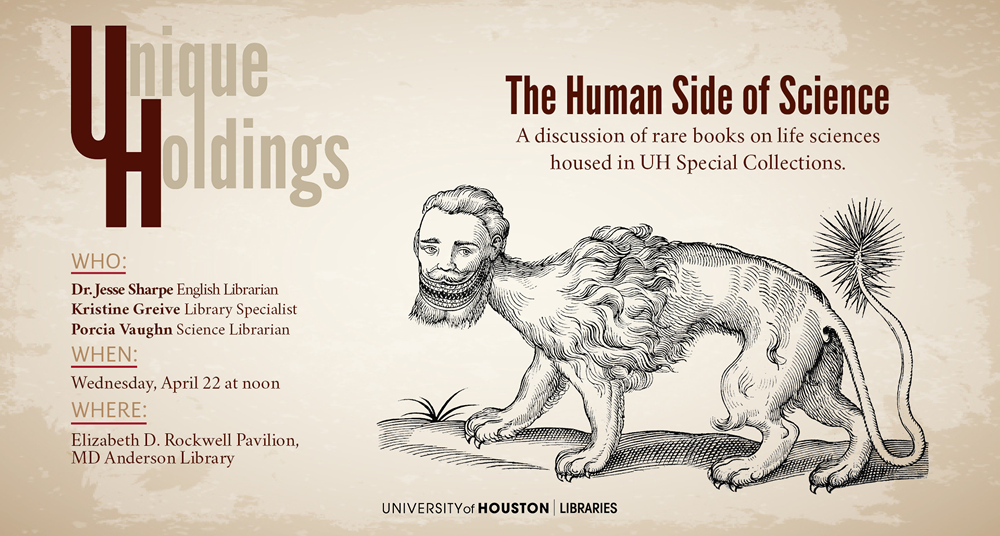
Biology and biochemistry librarian Porcia Vaughn, library specialist Kristine Greive, and English librarian Dr. Jesse Sharpe will present “The Human Side of Science,” a discussion of rare books on life sciences housed in UH Special Collections.
Biology and biochemistry librarian Porcia Vaughn, library specialist Kristine Greive, and English librarian Dr. Jesse Sharpe will present “The Human Side of Science,” a discussion of rare books on life sciences housed in UH Special Collections.
The April 22 talk is part of Unique Holdings, a new series that highlights the rare archival items held by Special Collections and available for use by faculty, students and researchers.
Future Unique Holdings talks will feature liaison librarians discussing other books and manuscripts of Special Collections that can inform and shape scholarly endeavors in any discipline.
Bring your lunch and enjoy an enlightening discussion!
What: “The Human Side of Science” brown bag presentation
When: Wednesday, April 22 at noon
Where: Elizabeth D. Rockwell Pavilion, MD Anderson Library
Re-Discovering Maria Cristina Mena
Born in Mexico City, María Cristina Mena (1893-1965) was the author of eleven short stories, five children’s books, and a nonfiction article. She is best known for her short stories, published mainly in The Century Magazine and American Magazine from 1913 to 1916. With renewed interest in the history of Chicano literature and the publication of all her short fiction in The Collected Stories of María Cristina Mena, her work is now receiving greater consideration.
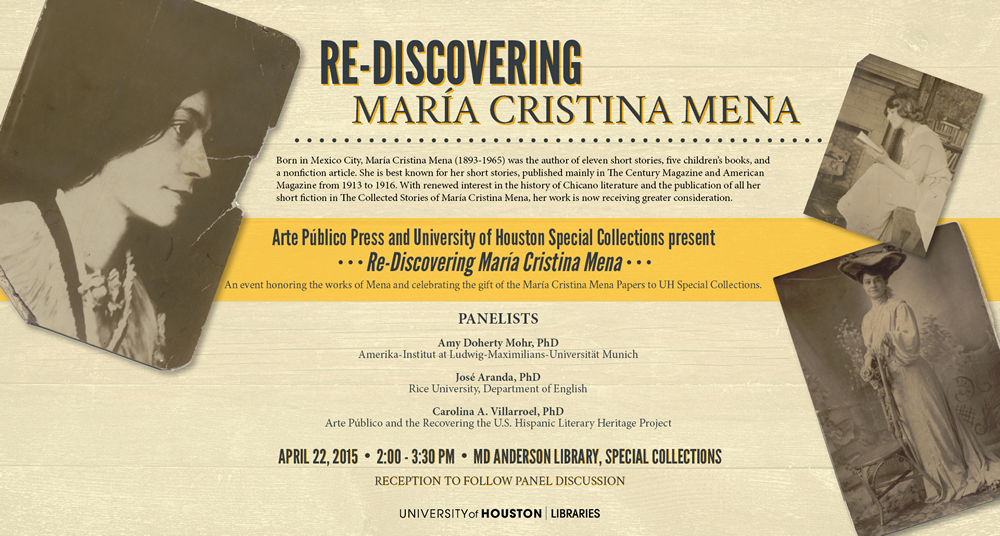
Arte Público Press and University of Houston Special Collections present “Re-Discovering María Cristina Mena,” an event honoring the works of Mena and celebrating the gift of the María Cristina Mena Papers to UH Special Collections.
Arte Público Press and University of Houston Special Collections present “Re-Discovering María Cristina Mena,” an event honoring the works of Mena and celebrating the gift of the María Cristina Mena Papers to UH Special Collections.
What: Re-Discovering Maria Cristina Mena panel discussion
When: Wednesday, April 22, 2:00 – 3:30 pm (reception at 4:00 pm)
Where: University of Houston MD Anderson Library, Special Collections, Evans Classroom
Panelists:
- Amy Doherty Mohr, PhD
Amerika-Institut at Ludwig-Maximilians-Universitat Munich - Carolina A. Villarroel, PhD
Arte Público Press and the Recovering the U.S. Hispanic Literary Heritage Project - José Aranda, PhD
Rice University, Department of English
Audiovisual Archivist Joins UH Special Collections
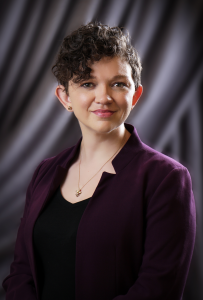
Emily Vinson joins the team as the new audiovisual archivist.
University of Houston Special Collections recently welcomed Emily Vinson, audiovisual archivist, to the team. She will shepherd the audiovisual collection on its journey through acquisition, preservation and digitization.
Vinson’s primary focus is the digitization of select materials from the KUHT Collection, including securing intellectual control and prioritizing items for accessibility.
The KUHT Collection presents a unique set of opportunities. It contains, in part, nearly 1200 film reels and 600 boxes of videotapes, the specific contents of which are unknown. “As is often the case with archival audiovisual collections, labeling is minimal, if present at all, so there are going to be many mysteries in the collection,” Vinson said. “There’s no finding aid yet, so we’re going to have a lot of questions in how to move forward with those pieces of the collection.”
Vinson will cross-reference each film and videotape with available titles, and query physical records in the collection to determine which programs hold lasting value and as such, rise in priority for digitization.
Even for highly-skilled archivists like Vinson, evaluating old films is a tricky process. Many may have become too fragile, and there may be only one opportunity for a successful transfer.
The process begins with an inspection of the films and tapes to determine its condition. Cleaning may be necessary. The films are then sent to film transfer experts for digitization, with care taken to preserve the original, which is then returned to Special Collections.
Vinson notes that public broadcasting audiovisual archives offer a uniquely intimate view of a community, unmatched in other media. “I think people engage with AV materials in a way that they don’t necessarily engage with paper materials,” Vinson said. “The insights you get into a city and community via the public broadcasting world is really unique. You see aspects of the city’s history that don’t come through in other ways. It’s a really exciting way to learn about a place, and to understand what was important to people then.”
Vinson was inspired to pursue library school after a particular event. She had just graduated from Tulane University before Hurricane Katrina hit. She evacuated and when she returned to the art gallery on campus where she worked, she saw that the university library had flooded. In the midst of widespread catastrophe, water was being pumped out and library staff were planning to elevate materials to try and salvage as much as possible.
“People saw value in the collection and found the means to preserve it,” Vinson said. “I thought that was the most amazing thing I had ever heard of. I had spent so many hours in this library, so that’s when I decided I should go to library school.”
Vinson attended UT Austin and earned a Master of Science in Information Studies with advanced study in conservation of library and archival materials. She held a fellowship in preservation and administration at New York Public Library, and later, had a two-year grant-funded position at WNYC, working on digitizing public radio archives. Most recently, she was an archivist at Rice University’s Baker Institute.
Beyond audiovisual preservation, Vinson is an avid reader (Agatha Christie novels are her favorites) and viewer of Netflix. She also plays tennis and sews. And she is enjoying UH culture. “I’ve had a really fantastic impression of the University so far,” she said. “I love that it’s a diverse campus and it’s really active and thriving.”
A Salute to Pat Bozeman
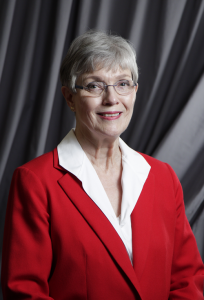
Pat Bozeman
When Pat Bozeman arrived at the University of Houston Libraries 30 years ago, Special Collections was in a state of transition, much like Bozeman herself, who was switching careers from the private sector in Boston to librarianship.
As a newly-minted graduate of the School of Library & Information Science at Indiana University, Bozeman accepted a position as special collections librarian in 1984. She felt that the job announcement was written just for her, because the department sought a person with knowledge of rare books and manuscripts, just the trade in which she had worked for 12 years prior.
Little did she know that, within less than two years, she would be appointed head of Special Collections.
“I have never, ever regretted that I came to Houston,” Bozeman says. She assumed that she would establish herself as a librarian, and eventually return to the Northeast. “Thirty years later, here I am,” she says with a smile. “I have really enjoyed being here at UH, and watching things grow.”
Bozeman was motivated to develop a new professional path for herself, while leading a small but increasingly active department. “Special Collections had been considered an add-on that nobody paid much attention to,” she says. “I was determined to change that.”
And she did. Bozeman was the first librarian to grow the Special Collections instruction program with diligent outreach to faculty and students, creating lectures for academic courses with use of the rare book collection and archival materials. Today, Special Collections hosts an average of 40 classes annually in its own classroom.
She organized and culled myriad books and archival items that had accumulated since the department’s inception in 1968, with careful attention to the needs of students and scholars. In recent years, she has overseen an increasing number of digitization projects focusing on the department’s unique materials and has worked tirelessly to enhance the visibility of the collections under her care. Bozeman strengthened existing collecting areas, such as Houston and Texas history, and established new archival units, such as Performing and Visual Arts, Hispanic Archives and Architecture and Planning. She supervised the creation of the Carey C. Shuart Women’s Archive and Research Collection, the Houston History Archives and the University Archives. Her team of librarians and archivists has flourished under her leadership, growing in number and national prominence.
The expansion of the department accelerated further when Dana Rooks became Dean of Libraries and placed more emphasis on Special Collections as an integral service point in this research library. Bozeman credits Rooks and Marilyn Myers, associate dean of Public Services, as stand-outs among those who championed the mission of the department and supported Bozeman in her vision of its relevance and growth.
View photos from Pat Bozeman’s retirement celebration.
In addition to leading Special Collections, Bozeman has been substantially involved in scholarship and service. She has curated or co-curated over 50 exhibits and Digital Library collections (and has supervised an even greater list), has given presentations on a wide range of topics in special collections and archives management, has organized conferences and workshops and, since 2004, has served as an adjunct faculty member in the University of North Texas’ School of Library and Information Science. She also has served in numerous professional associations at the national and regional level.
Throughout her long and impactful career, the rare and unique items of Special Collections remained a captivating reminder of why Bozeman loves this field, as she enjoys the thrill of discovery and making historical connections. She has worked with countless books, documents and objects that carry their own hidden stories, such as the collection of Revolutionary War letters in which she discovered that the person who penned many of those letters, a colonel in the 2nd New Jersey Regiment, was her first cousin eight times removed.
A few of her most treasured items include a 1692 court document, signed by Cotton Mather, convicting an Andover, Massachusetts woman as a witch in the infamous Salem trials. There is a fine press book of Edgar Allan Poe’s The Raven that, from its slipcase inward, evokes the somber image of that ominous black bird. Bozeman was later fortunate enough to be able to purchase Alan James Robinson’s original drawings for that book. She recalls a time early in her career when she reached for something peeking over the edge of a top shelf that turned out to be a Civil War-era document signed by President Abraham Lincoln. She also has enjoyed teaching with all manner of rare books, from medieval manuscript books of hours and the first edition of the King James bible (1611), to a wide array of children’s pop-up books.
And there is an exciting story behind an 1836 broadside playbill from New York City’s American Theatre, advertising a vaudevillian evening to benefit the “Texians” of the Texas Revolution. Although listed in Thomas Streeter’s Bibliography of Texas, 1795-1845, the notation indicated that Streeter himself had been unsuccessful in locating an original, having seen only a photostatic copy at the Texas State Library. In 2004, Bozeman discovered an original framed copy, belonging in the papers of New Deal Texas governor James V. Allred, one of the first collections to come to Special Collections in the 1960s. Bozeman’s resulting article, titled “‘For the Relief of the Texians’: A Theatrical Benefit to Aid the Texas Revolution,” appeared in the July 2012 Southwestern Historical Quarterly.
Although she is retiring from her post as head of Special Collections, Bozeman’s work continues. Her first project will be to take part in the ongoing research to create an online database of Texas artists and artisans for the Museum of Fine Arts, Houston-Bayou Bend.
In honor of her retirement, gifts may be made to the Pat Bozeman Endowment in Special Collections that provides travel stipends for researchers using the University of Houston Libraries’ archival collections. To make a gift, contact Todd Marrs at 713.743.9741.
New Collection Portrays Houston’s Architectural Domain
[Tweet “Renowned architectural photog Joe Aker’s collection now at University of Houston.”] Architectural photographer Joe Aker has given a collection of images to the University of Houston Libraries Special Collections.
The Aker Architectural Photographic Records Collection comprises roughly 50,000 distinct images depicting scenes of commercial architecture over the past three decades.

SOM 450 Lexington, New York City. Image courtesy of Joe Aker.
Aker, owner of Aker Imaging, has worked with leading architecture and real estate firms, such as Skidmore, Owings and Merrill, Robert A.M. Stern, César Pelli, Pickard Chilton, Kohn Pedersen Fox, Philip Johnson, HOK, Kirksey and Ziegler Cooper; as well as Gerald D. Hines Interests and Trammell Crow.
Of particular interest are images of properties developed by Gerald D. Hines, for which the University of Houston College of Architecture is named. It is one of the largest collections of photographs of his buildings completed in the twentieth century.
In 2011, Aker began considering the future for his vast collection of photography. He contacted UH Special Collections, whose mission is to preserve, safeguard, organize, and describe primary sources in a number of collecting areas for teaching and research activities of students and scholars.
The Aker collection offers a rare view of the architectural landscape in Houston and other major cities, including a photographic record of original models of structures that were never built, as well as plans, renderings, models and final photography of the finished buildings. What makes this collection of images special are the many photographs showing the process of design from the first drawing of the first model to the final design model and the finished building.

Composite of Hines Del Bosque, Mexico City. Image courtesy of Joe Aker.
Aker was one of the first to digitally produce structural model composites before the advent of computer-generated graphics. Working with Houston digital artist Raphaele Malandain, he would photograph a site where a building was set to be constructed, photograph the building model, and drop the model image onto the site image using analog film composition, resulting in a close representation of the future finished building.
As a whole, Aker says, the collection tells a fascinating story of Houston’s economic booms and busts. For more information on this new and growing collection, contact Vince Lee.
Unique Holdings at University of Houston Libraries
University of Houston Libraries invites faculty, students, researchers and anyone interested in discovering rare literary treasures to attend a brown bag lecture on Wednesday, October 29 in the Elizabeth D. Rockwell Pavilion at the MD Anderson Library.
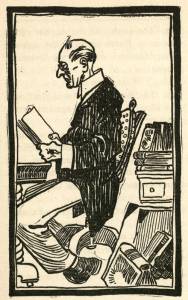
Fables in Slang | George Ade | from UH Special Collections. Part of The Last Untapped Resource in Houston brown bag lecture.
English librarian Dr. Jesse Sharpe and library specialist Kristine Greive will present “The Last Untapped Resource in Houston,” a discussion of unique works of literature housed in UH Special Collections.
The October 29 lecture is the first installment of Unique Holdings, a new series that highlights the rare archival items held by Special Collections and available for use by faculty, students and researchers.
Future Unique Holdings talks will feature liaison librarians discussing other books and manuscripts of Special Collections that can inform and shape scholarly endeavors in any discipline.
Bring your lunch and enjoy an enlightening discussion!
What: “The Last Untapped Resource in Houston” brown bag lecture
When: Wednesday, October 29 at noon
Where: Elizabeth D. Rockwell Pavilion, MD Anderson Library
